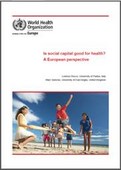Is social capital good for health? A European perspective

Download
By Lorenzo Rocco and Marc Suhrcke
2012, iv + 16 pages
ISBN 978 92 890 0273 8
This publication is only available online.
The aim of the research reported here was to examine the causal impact of social capital on health in 14 European countries. Using data from the European Social Survey, supplemented by regional-level data, the authors studied whether individual and/or community-level social capital positively affects health. They controlled for other factors expected to affect health, and addressed – via an instrumental variable approach – the challenge of assessing causality in the relationship between social capital and health. The large variance of the error term due to measurement errors calls for strong instruments to obtain reliable estimates in a finite sample. The dataset was rich enough in information to allow the finding of a seemingly strong causal relationship between social capital and individual health. Community social capital (defined at the regional level) appears not to affect health once individual-level social capital is controlled for. Taken at face value, the findings suggest that policy interventions should be aimed at improving primarily individual social capital. This would achieve a double effect: directly improving individuals’ health and contributing to community social capital, which reinforces the beneficial role of individual social capital.



